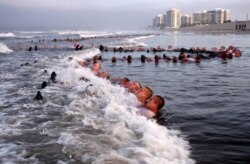A new Pentagon recruitment policy considers hospitalization for COVID-19 an automatic disqualification for acceptance without a medical waiver from the recruit’s military service branch.
Individuals who were hospitalized with COVID-19 “are medically disqualified for accession, subject to further review of hospitalization/comorbidity records, and waiver by a Service Medical Waiver Authority,” the new policy reads.
Military Entrance Processing Command (MEPCOM), which screens military applicants, said in a statement given to VOA on Thursday that patients who were hospitalized “may be contagious for a longer period than others” and “are likely to require evaluation for residual physical performance limitations (e.g., pulmonary and end-organ function) before medical qualification.”
Long-term health effects for this group “are unknown,” the command said, which is why a waiver review is required.
The guidance also states that recruits who were diagnosed with COVID-19 but not hospitalized are medically qualified to process into basic training following 28 days of home isolation.
“Non-hospitalized cases will not be permanently disqualified,” MEPCOM said.
A DOD memo leaked to the press Monday said that any history of COVID-19 would be permanently disqualifying for recruits.
A defense official told VOA the memo was “interim guidance” that was updated Wednesday.
Michael O’Hanlon, a senior defense fellow at the Brookings Institution, told VOA the tone of new Pentagon directive was regrettable.
“Why not say, in gentler terms, ‘Until we can be confident that we understand the trajectory of this disease and recovery process, including the possibility of relapse or recurrence, we cannot yet take COVID-19 positive individuals into the force'?” O’Hanlon said.
It's unclear whether the change will affect recruiting numbers. James Long, a scholar and regular contributor to the Modern War Institute at West Point, said any effects at this stage would be insignificant, while cautioning about accepting recruits with potential health problems.
“Even a minor health problem in the force can have massive costs and consequences for metrics like readiness and operational performance,” Long said. “I think the DOD's medical leaders are wise to focus on this issue early.”
All four service branches hit their recruiting goals in 2019, bringing tens of thousands of new service members into the U.S. military.
But an AP report last month said the armed services were struggling for new recruits as families and communities follow stay-at-home guidance because of COVID-19. Online recruiters were “often finding people too consumed with their own financial and health care worries to consider a military commitment right now.”
COVID-19 and current troops
COVID-19 hospitalizations are “not immediate disqualifications” for current troops, according to a senior defense official. However, it could potentially change the careers of some of the 113 military service members who have been hospitalized by the disease, should lingering effects impact the service members’ ability to do their jobs.
The official stressed that any service member who is able to return and perform normal job duties after a COVID-19 hospitalization would not need a medical board evaluation. But those who are no longer able to perform their duties would need to undergo a medical board process that could lead to a change in military specialization or a discontinuation of service.
“This is similar to what’s done with any illness or injury obtained while in the military,” the senior official told VOA.
The official likened a service member who develops lung issues from a COVID-19 hospitalization to a service member who develops chronic asthma after joining the service. Severe asthma could prevent an infantryman, for example, from carrying out certain infantry requirements, and the military may find that lung problems associated with a COVID-19 hospitalization may yield the same result.
“The guidance is evolving,” the official told VOA, adding that the military would refine its policies as necessary.







